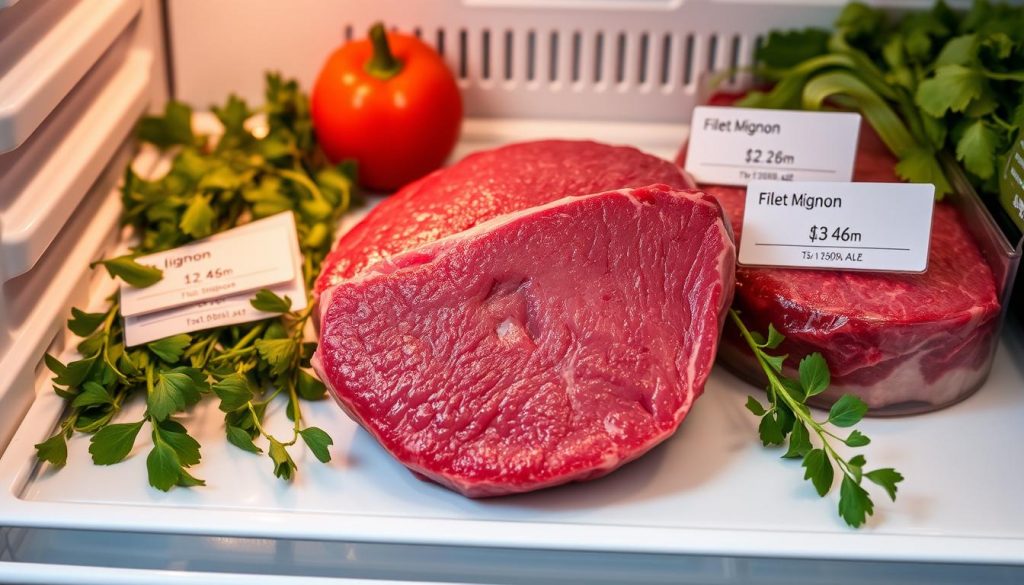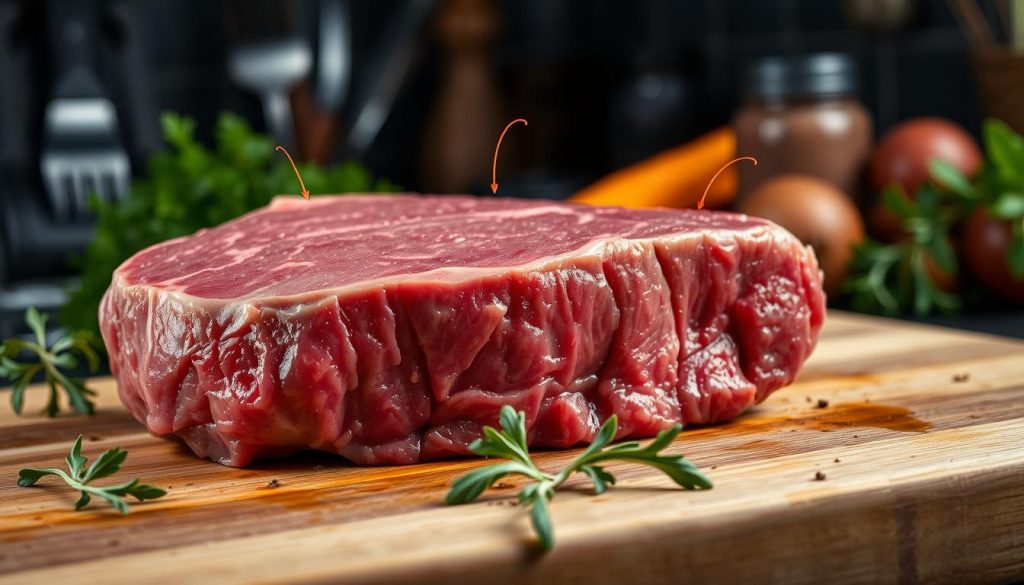Enjoying filet mignon’s rich flavor means keeping it fresh. Our research shows how to keep this top beef cut fresh. The way you store it greatly affects how long it lasts.
Our tests showed vacuum-sealed filet mignon stays fresh longer. But, the usual plastic or paper wrap from the store doesn’t last as long. Knowing how to keep filet mignon fresh is key to avoiding spoilage.
Key Takeaways
- Raw filet mignon has a shelf life of 3-5 days in the fridge set at 40°F or lower.
- Airtight containers can extend cooked filet mignon’s enjoyment window to 3-4 days in the fridge.
- For best flavor and safety, the USDA recommends cooking marinated steak within 6-24 hours post-marination.
- Optimal freezer storage of filet mignon can last 4-12 months at 0°F, with vacuum-sealing being a superior method.
- Careful attention to refrigeration and thawing methods is essential to reduce bacterial growth risk and ensure food safety.
- High standards in packaging are critical, as vacuum-sealed steaks last longer than those from a butcher case.
- Proper storage and handling of filet mignon can greatly extend its shelf life.
Understanding Filet Mignon: Tips Before Refrigerating
Before you store that succulent filet mignon in your fridge, it’s important to know a few things. Understanding how to pick the best filet mignon and how packaging affects its freshness is key. These steps help keep your meat fresh and tasty while it’s in the fridge. Let’s explore the essential criteria and packaging details that every meat lover should know.
Selection Process: Choosing the Best Quality
When selecting filet mignon, look for a vibrant, uniform color and texture. These signs are important in determining the meat’s freshness. Beef should have a bright red color when exposed to air at the butcher’s counter, showing it’s fresh. A deeper red or purple might mean vacuum-sealed meat, which is also fresh but less exposed to air.
The Role of Packaging on Filet Mignon’s Freshness
The packaging of filet mignon is very important. Choosing between traditional butcher paper and plastic wrap versus vacuum-sealing greatly affects freshness. Vacuum-sealing, for example, can extend shelf life by reducing contact with oxygen and bacteria, slowing down spoilage.
Now, let’s compare how different packaging options affect meat’s longevity and quality:
| Packaging Type | Refrigeration Freshness Duration | Freezer Shelf Life |
|---|---|---|
| Butcher Paper and Plastic Wrap | 3-5 days | 1 month |
| Vacuum-Sealed | Extended by 2-3 days | 6-12 months |
Knowing these details before refrigerating your filet mignon ensures it stays succulent. These tips help you keep your meals tasty and safe at home.
How Long Does Filet Mignon Last in the Fridge
Enjoying filet mignon’s rich flavor means knowing how long it stays fresh in the fridge. A fresh, uncooked filet mignon stays at its best for 3 to 5 days in a fridge at 40 degrees Fahrenheit or lower. This temperature is key to slowing down spoilage and keeping bacteria away.
The refrigerated beef steak shelf life can change based on the meat’s freshness and storage. But following the best fridge storage tips is key to keeping your steak tasty and safe.

Now, let’s look at what affects the raw filet mignon freshness period:
| Storage Factor | Impact on Filet Mignon |
|---|---|
| Temperature below 40°F | Maximizes freshness for up to 5 days |
| Above 40°F | Increases risk of spoilage, reduces safe consumption window |
| Initial Meat Quality | Higher quality meat has a longer fridge life |
| Packaging Integrity | Compromised packaging can decrease shelf life |
Keeping filet mignon fresh in the fridge needs careful handling and attention to storage. By managing these factors well, we ensure a great dining experience when we cook this special beef.
We strive to offer the best steak experience, balancing taste with safety. Remember, for premium steaks like filet mignon, the fresher, the better. Effective management of the refrigerated beef steak shelf life enhances our meal enjoyment without risking health.
Safeguarding Filet Mignon: Proper Refrigeration Techniques
To keep your filet mignon fresh, it’s key to use safe refrigeration methods. It’s not just about the fridge’s temperature. Wrapping and where you place it in the fridge matter too.
Optimal Refrigeration Temperature Setting
Your fridge should be at or below 40°F to keep your steak fresh. This slows down bacteria growth and keeps your filet mignon fresh longer. The USDA says raw steak can stay good for 3 to 5 days at this temperature.
Best Practices for Wrapping and Placement
Always store filet mignon in its original packaging or use airtight wraps. This stops air and moisture from getting in, which helps keep it fresh. Put the steak on the bottom shelf to avoid juices from getting on other foods.
Here’s a quick guide to show how long different steaks stay fresh. It highlights the need to consider storage times to keep your filet mignon fresh:
| Type of Steak | Storage Time in Fridge | Recommended Practices |
|---|---|---|
| Raw Filet Mignon/Steak | 3 to 5 days | Store at or below 40°F, original packaging/rewrapped |
| Ground Steak | 1 to 2 days | Store separately, avoid cross-contamination |
| Cooked Steak | 3 to 4 days | Refrigerate within two hours of cooking |
| Sliced Steak (for sandwiches) | 3 to 4 days | Keep in airtight containers or wrapped tightly |
By following these tips, you ensure your steak stays safe and fresh. Proper refrigeration keeps the taste and texture of filet mignon perfect, making every meal a joy.
The Impacts of Vacuum-Sealing on Filet Mignon’s Shelf Life
Vacuum-sealing does more than make your meat look good. It’s a key way to keep meat fresh for longer, like with filet mignon. By removing air, it stops oxygen from spoiling the meat. Let’s explore how it helps your filet mignon.
What is Vacuum-Sealing?
Vacuum-sealing removes air from packaging before sealing it with plastic. This lack of oxygen helps keep the steak looking fresh. The Chicago Steak Company says it’s great for keeping steaks fresh when stored right.
Why Oxygen Matters: Color and Freshness
Oxygen is good for life, but bad for meat packaging. It can make meat lose its color and quality. Vacuum-sealing keeps the meat’s color and taste better.
Here’s a table showing vacuum-sealing’s effect on meat, focusing on filet mignon:
| Meat Type | Normal Freezer Life | Vacuum-Sealed Freezer Life |
|---|---|---|
| Filet Mignon | 6 months | Up to 18 months |
| Whole Ham/Slices | 2 months | 6 months |
| Whole Turkey/Chicken | 12 months | 36 months |
| Cooked Meats | 2 months | 6 months |
Vacuum-sealed filet mignon stays fresh up to three times longer than regular wrapping. This is because it prevents freezer burn and keeps moisture and flavor. For more on storing meat, check out this guide.
Vacuum-sealing not only extends meat’s life but also makes it safer by stopping bacteria growth. It’s great for both chefs and home cooks, ensuring better quality and longer enjoyment of steaks.
Handling Raw Filet Mignon: From Refrigeration to Preparation
Preparing raw filet mignon requires careful handling and strict safety rules. This ensures delicious and safe meals. Knowing how to move this premium cut from the fridge to the stove is key. We’ll look at the important steps and safety tips for this process.
First, it’s important to know how long to keep filet mignon in the fridge. Steaks should be cooked within 3 to 5 days for the best taste and quality. Start by checking if the steak was stored at the right temperature, below 4 degrees Celsius. Wrong temperatures can lead to bad bacteria growth and spoilage.
- Check the Refrigeration Time: Make sure the steak hasn’t been in the fridge too long, 3 to 5 days. Vacuum sealed steaks should not be stored longer than 10 days.
- Inspect for Consistent Chilling: Check if the steak stayed at a steady 4 degrees Celsius or below.
- Assess the Packaging: The packaging should be intact with no holes. Vacuum-sealed steaks should be sealed tight. If in corn oil, make sure the meat is fully covered.
When moving from fridge to cooking, preparing raw filet mignon needs clean tools and surfaces. Place the steak on a clean plate and let it warm up for 20-30 minutes. This makes the steak cook evenly and stay tender.
Following guidelines from trusted sources like the UK Food Standard Agency is key. It ensures filet mignon is both safe and of high quality.
Remember, the care in refrigerated steak handling and following raw meat safety guidelines is more than just following rules. It’s about respecting the meat’s quality and the health of those eating it. Sticking to these principles makes the meal better and safer.
In short, managing the steak from fridge to plate is critical. It makes sure every filet mignon served is tasty and safe.
Signs of Spoilage: When Your Filet Mignon Has Gone Bad
Enjoying a premium cut like filet mignon is special. But, using spoiled meat can ruin the taste and safety. It’s important to know how to spot spoiled filet mignon for a great dining experience. We’ll show you how to check for steak spoilage and meat freshness.
Visual Cues: Discoloration and Surface Texture
Inspecting meat freshness starts with looking closely. Spoiled filet mignon shows clear signs. Look for any discoloration; it should be a vibrant red. Gray, brown, or green spots mean it’s spoiled.
Also, check the texture. Fresh steak is moist but not slimy. If it feels sticky or slimy, it’s a sign of bacterial growth.
Olfactory Signals: The Smell Test
The smell of filet mignon is key to its freshness. Fresh steak smells mild or has no smell. A sour or ammonia-like smell means it’s spoiled.

Always check the use-by dates and storage of your steak. Here’s a handy table summarizing the key aspects:
| Aspect | Recommendation |
|---|---|
| Refrigerator Storage Duration | 3-5 days |
| Freezer Storage Duration | Up to 12 months |
| Cooking Temperature | At least 145°F (63°C) |
| Signs of Spoilage | Slimy texture, discoloration, strong bad odors |
| Food Safety Action | Discard if spoiled to prevent foodborne illnesses |
Spotting spoiled filet mignon is key to great meals and safety. Knowing about steak spoilage and meat freshness helps. Now, you can make sure every filet mignon is safe and delicious.
Maximizing Freshness: Seasoning and Cooking Timelines
Preparing a luxurious dinner with filet mignon requires keeping the steak’s quality high. It’s not just about the cooking technique. It’s also about timing and preparation to bring out the best flavors. Here’s how to make sure every bite is juicy and full of flavor.
Filet mignon seasoning is key to unlocking the steak’s full taste. Use a light touch of salt and pepper just before cooking. This way, you enhance the natural flavors without overwhelming the meat. Each bite should be as exciting as the last.
To keep your filet mignon tender and juicy, follow these guidelines:
| Steak Condition | Preparation Time Before Cooking | Cooking Recommendation |
|---|---|---|
| Marinated Filet Mignon | 6-24 hours | Grill or pan-fry over high heat |
| Unmarinated Filet Mignon | Within 3-5 days of refrigeration | Sear on high heat for a crusty, caramelized exterior |
Following these timelines is essential to keep the steak’s quality high. Every step, from seasoning to cooking, is important. Whether grilling or pan-searing, timing is everything to get that perfect medium-rare.
For more tips on handling, seasoning, and cooking prime beef, check out Mastering Prime Beef: Essential Tips for.
In conclusion, mastering filet mignon requires precision in seasoning and cooking. By following these steps, you ensure every steak meets gourmet standards. Whether it’s a special occasion or a family dinner, the right cooking approach makes every meal a celebration of flavors.
Storage Strategies: Extending Filet Mignon’s Fridge Life
We love fine dining and keeping premium cuts like Filet Mignon fresh. Whether it’s USDA Prime or American Wagyu, we aim to enjoy these meats for longer. We focus on marinating and preserving to enhance the taste.
Marination and its Effects
Marinating Filet Mignon adds deep flavors. But, be careful not to marinate too long to avoid a mushy texture. A good marination extends shelf life and enhances taste.
Tips for Storage After Cooking
After cooking to perfection, let the steak rest for 5-8 minutes. Then, serve it on a warm plate. For leftovers, store them in an airtight container. They should last 3 to 4 days in the fridge.
If you want to keep them longer, freeze them. Wrap them well, label, and use within three months. This way, every bite is as good as the first.




